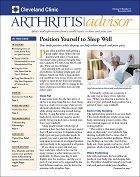A troubling association exists between depression in older adults, a type of drug used to treat depression, and an elevated incidence of bone fractures and bone loss among those who take the drugs. "There is no definitive evidence," says Holley Thacker, MD, Director of Cleveland Clinics Center for Specialized Womens Health, "but there have been observational associations involving depression, certain medications, and low bone density." A better understanding of these three elements in this unhealthy triangle may help you to avoid future problems. The American Psychological Association (APA) says that although it is not a normal result of aging, nearly 20 percent of older adults suffer from depression. The rate escalates to 50 percent among those living in nursing homes. The APA also points out that older Americans have the highest suicide rate of any age group, and that depression is the greatest risk factor. More than 80 percent of older adults are eligible for treatment, though many do not get medical help because of insurance issues, poor diagnosis of their condition, or the dwindling number of geriatric mental health professionals.
To continue reading this article or issue you must be a paid subscriber.
Sign in





























